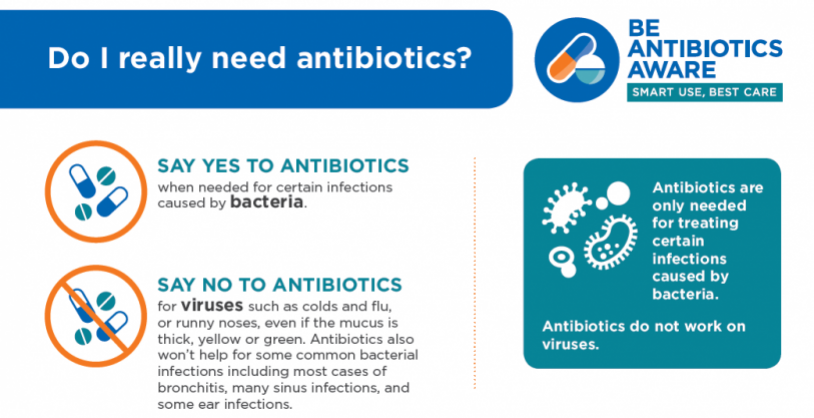Medical Minute: The Importance of Safe Antibiotic Use
Submitted by Brianna Hoffman, Pharm.D. at West Holt Medical Services
ATKINSON — During National Antibiotic Awareness Week, November 12-18, the Antimicrobial Stewardship Committee at West Holt Medical Services, in conjunction with Greater Sandhills Medical Clinic, would like to remind the public of the importance of safe antibiotic use.
The Antimicrobial Stewardship Committee at West Holt Medical Services consists of the following medical professionals: Pharmacist Brianna Hoffman, Physician Assistant Jeanne Laible, Laboratory Scientist Andrea Kerkman, Chief Nursing Officer Tana O’Neill, Director of Primary and Specialty Care Clinics Tracy Ludwig, Infection Prevention Nurse Talya Shutt.
It is our role to implement policies and interventions to ensure proper antibiotic use at West Holt Medical Services. This includes monitoring antibiotic prescribing and resistance patterns, reporting information on antibiotic use and resistance to healthcare providers, nurses, and staff, and educating clinicians about resistance and optimal prescribing.
According to the Centers for Disease Control and Prevention, at least 2 million people get infected with antibiotic-resistant bacteria each year in the United States. At least 23,000 die as a result. Antibiotic resistance, one of the most urgent threats to the public’s health, occurs when bacteria no longer respond to the drugs designed to kill them.
What Do Antibiotics Treat?
Antibiotics are critical tools for treating a number of common infections, such as pneumonia, and for life-threatening conditions including sepsis. Antibiotics are only needed for treating certain infections caused by bacteria.
What Don’t Antibiotics Treat?
Antibiotics do not work on viruses, such as colds and flu, or runny noses, even if the mucus is thick, yellow or green. Antibiotics also won’t help some common bacterial infections including most cases of bronchitis, many sinus infections, and some ear infections.
What Are The Side Effects of Antibiotics?
Anytime antibiotics are used they can cause side effects or lead to antibiotic resistance. When antibiotics aren’t needed, they won’t help you, and the side effects could still hurt you. Common side effects range from things like rashes and yeast infections to severe health problems. More serious side effects include Clostridium difficile infection (also called C. difficile or C. diff), which causes diarrhea that can lead to severe colon damage and death.
If you need antibiotics, take them exactly as prescribed. Patients and families can talk to their healthcare provider if they have any questions about their antibiotics, or if they develop side effects, especially diarrhea, since that could be C. difficile, which needs to be treated.
Can I Feel Better Without Antibiotics?
Patients and families can ask their healthcare provider or pharmacist about the best way to feel better while their body fights off the virus. Respiratory viruses usually go away in a week or two without treatment.
How Can I Stay Healthy?
We can all stay healthy and keep others healthy by cleaning our hands, covering our coughs, staying home when sick, and getting recommended vaccines, for the flu, for example.
Antibiotics save lives. When a patient needs antibiotics, the benefits outweigh the risks of side effects and antibiotic resistance. Improving the way we take antibiotics helps keep us healthy now, helps fight antibiotic resistance, and ensures that life-saving antibiotics will be available for future generations.
What can I do to prevent antibiotic resistance?
Ask questions! Ask your healthcare provider if you need an antibiotic for your illness. If you don’t need one, ask what you can do to feel better. Do not pressure your healthcare provider for a prescription. If you are prescribed an antibiotic, make sure to take it exactly as directed and take all of it. Do not take an antibiotic that was prescribed for someone else. It may not be the right kind of medicine for your illness.
Antibiotics are great if you need them. They make us feel better and get rid of infections. We just have to remember to use them wisely. If we don’t, the bacteria just might win.
To learn more about safe antibiotic use, visit www.cdc.gov/antibiotic-use.



